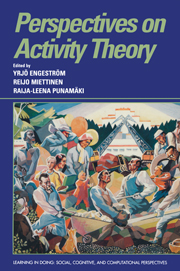Book contents
- Frontmatter
- Contents
- List of contributors
- Series foreword
- Introduction
- Part I Theoretical issues
- 1 Activity theory and individual and social transformation
- 2 The content and unsolved problems of activity theory
- 3 Knowledge as shared procedures
- 4 Activity theory in a new era
- 5 Society versus context in individual development: Does theory make a difference?
- 6 Cultural psychology: Some general principles and a concrete example
- 7 Laws, logics, and human activity
- 8 Collapse, creation, and continuity in Europe: How do people change?
- 9 Activity theory and the concept of integrative levels
- 10 The relevance to psychology of Antonio Gramsci's ideas on activity and common sense
- Part II Language and its acquisition
- Part III Play, learning, and instruction
- Part IV Technology and work
- Part V Therapy and addiction
- Author index
- Subject index
9 - Activity theory and the concept of integrative levels
Published online by Cambridge University Press: 05 June 2012
- Frontmatter
- Contents
- List of contributors
- Series foreword
- Introduction
- Part I Theoretical issues
- 1 Activity theory and individual and social transformation
- 2 The content and unsolved problems of activity theory
- 3 Knowledge as shared procedures
- 4 Activity theory in a new era
- 5 Society versus context in individual development: Does theory make a difference?
- 6 Cultural psychology: Some general principles and a concrete example
- 7 Laws, logics, and human activity
- 8 Collapse, creation, and continuity in Europe: How do people change?
- 9 Activity theory and the concept of integrative levels
- 10 The relevance to psychology of Antonio Gramsci's ideas on activity and common sense
- Part II Language and its acquisition
- Part III Play, learning, and instruction
- Part IV Technology and work
- Part V Therapy and addiction
- Author index
- Subject index
Summary
Introduction
The work and theory of Vygotsky (1978, 1987), Luria (1966, 1987), and Leont'ev (1978) reflect their commitment to dialectical and historical materialism. This commitment led to their interest in the phylogeny as well as the ontogeny of the activity of organisms. The personal and societal histories of these three leaders in human science did not make it possible for them to be aware of complex developments in the study of the evolution of behavior.
Vygotsky was clearly knowledgeable about the most well-known research in primate behavior, but the significant theoretical controversies about such work were to occur after his lifetime. Luria and Leont'ev were equally well read in the European and North American literature. However, they also were part of the Soviet scientific community and reflected the dominant thinking in the biological and physiological disciplines. Soviet scientists by and large accepted the traditional division between “animals” and humans; although humans had some “lower animal instincts, drives and emotions,” they were reflective primarily of societal processes (Graham, 1987). The history of this view in relation to Marx, Engels, and Lenin requires its own treatment, but it is fair to say that it was the view held by those three dialectical materialists, as well as by Vygotsky, Luria, and Leont'ev.(the “Troika” of activity theory).
This belief by the Troika does not detract from their significant development of human activity theory based on historical and dialectical materialism.
Information
- Type
- Chapter
- Information
- Perspectives on Activity Theory , pp. 133 - 146Publisher: Cambridge University PressPrint publication year: 1999
Accessibility standard: Unknown
Why this information is here
This section outlines the accessibility features of this content - including support for screen readers, full keyboard navigation and high-contrast display options. This may not be relevant for you.Accessibility Information
- 4
- Cited by
